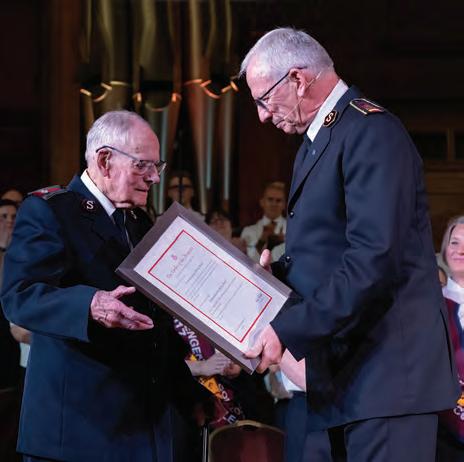INTERVIEW
Weeping with those who weep
In an interview with Steven Spencer in 2010, Major Dorothy Graham recalled the Army’s response to the Aberfan disaster
I
N 1966, three weeks of heavy autumn rains saturated a colliery spoil tip on a mountain slope above the village of Aberfan in south Wales. It collapsed on 21 October, sliding downhill as a slurry and engulfing Pantglas Junior School, where lessons had just begun; 116 children and 28 adults were killed. Among those who responded to the disaster was Captain Dorothy Graham, who was serving as a corps officer at Pentre in the Rhondda Valley at the time. She was the first Salvation Army officer to arrive on the scene. In 2010, 44 years after the tragedy, Steven Spencer, the director of the International Heritage Centre, interviewed Major Dorothy about the Army’s emergency support work at the disaster. This interview has not been published before. 12
Salvationist 1 May 2021
YOU WERE TRAVELLING BACK FROM OFFICERS COUNCILS AT SWANWICK WHEN THE DISASTER TOOK PLACE. TELL US WHAT HAPPENED. We had called in for petrol. My friend, the driver of the car, came out and she was broken-hearted. ‘Whatever is the matter?’ we asked. She said there had been a terrible disaster at Aberfan. The mountain had moved and engulfed the school and the area around it, and they needed as many people to help as possible. We went home, changed out of our best uniforms into older ones and went immediately to Aberfan. We heard the news at about 5pm and we were probably there by 6.45pm. The disaster happened at about 9.30am, but at 7am they knew the
mountain was moving, so really the children need not have been in school. However, they didn’t take any notice and the disaster was the outcome. Aberfan looked like a war zone. It was dreadful. Instead of being level with the road, we were high up above it because of all the slurry that had come from the mountain. It was quite unbelievable that we were walking so high up from the ground. I was given the job of standing in a long line with lots of other people. There were all sorts of different people, including Teddy boys and those you could see were well educated. Buckets were being filled with sludge and passed down the line. They couldn’t bring in dredges for fear they would injure the children and that was the only way we could get the slurry out. So, for a couple of hours, we were in line taking away buckets of sludge until we were stopped and new people took over. After that I went around the various places where they were bringing out bodies and sympathised with the people that were there. One lady was broken-















